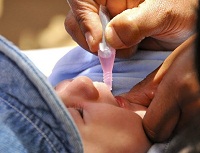Photo of the Week
- Details
 In April 2011 during the launch of the 9th Vaccination Week in the Americas, hundreds of children were immunized against vaccine preventable diseases, on the binational border between Bolivia and Peru. The tenth anniversary of Vaccination Week in the Americas will be celebrated from 21-28 April 2012. VWA is an extraordinary effort led by the countries and territories of the Region to advance equity and access to vaccination.
In April 2011 during the launch of the 9th Vaccination Week in the Americas, hundreds of children were immunized against vaccine preventable diseases, on the binational border between Bolivia and Peru. The tenth anniversary of Vaccination Week in the Americas will be celebrated from 21-28 April 2012. VWA is an extraordinary effort led by the countries and territories of the Region to advance equity and access to vaccination.
- Details
 Three children from Xingú, Brazil joined the celebration of Vaccination Week in the Americas 2005. Once completing their vaccination schedules, they proudly wore the colorful sticker of the campaign. This year during the first World Immunization Week, 21-28 April, countries around the globe unite to promote equity and access to vaccination.
Three children from Xingú, Brazil joined the celebration of Vaccination Week in the Americas 2005. Once completing their vaccination schedules, they proudly wore the colorful sticker of the campaign. This year during the first World Immunization Week, 21-28 April, countries around the globe unite to promote equity and access to vaccination.
- Details
 In Peru, Maximiliana has been herding sheep and goats since she was a small child. But much has changed in the past 60 years. When she was young, grass was plentiful. Now she has to walk 15 kilometers across the parched pastures of the high Peruvian Andes to find enough grazing for her animals. Maximiliana and her husband recently joined a senior citizens' club where they help to work communal fields. This supplements their diet and income. "I still love walking in the mountains with the animals", 65-year old Maximiliana says, "but I'll need to find some other way to earn money because I won't be able to keep doing this forever."
In Peru, Maximiliana has been herding sheep and goats since she was a small child. But much has changed in the past 60 years. When she was young, grass was plentiful. Now she has to walk 15 kilometers across the parched pastures of the high Peruvian Andes to find enough grazing for her animals. Maximiliana and her husband recently joined a senior citizens' club where they help to work communal fields. This supplements their diet and income. "I still love walking in the mountains with the animals", 65-year old Maximiliana says, "but I'll need to find some other way to earn money because I won't be able to keep doing this forever."
- Details
 Mirta Nordet and her teenage grandson Damian are very close. When his 69-year-old grandmother offered to teach him his first salsa steps, Damian immediately said yes. "I want my grandchildren to learn as much as possible about the culture and traditions of my home country Cuba," says the retired ophthalmologist, who goes dancing several times a month. "Salsa is a kind of liberation for me. It gives me energy and I stop thinking," she enthuses. Despite some recent back problems, Mirta hopes to go on dancing long into the future.
Mirta Nordet and her teenage grandson Damian are very close. When his 69-year-old grandmother offered to teach him his first salsa steps, Damian immediately said yes. "I want my grandchildren to learn as much as possible about the culture and traditions of my home country Cuba," says the retired ophthalmologist, who goes dancing several times a month. "Salsa is a kind of liberation for me. It gives me energy and I stop thinking," she enthuses. Despite some recent back problems, Mirta hopes to go on dancing long into the future.
- Details
 Photo: Peru 1991. After a disaster and in everyday life, public health interventions that allow for adequate sanitation in communities prevent the spread of disease and help save lives. In Panama, the joint program Economic Governance of Water and Sanitation works to reduce gaps in public services of safe water and sanitation in vulnerable indigenous areas of the Comarca Ngabe-Buglé. The program aims to expand coverage and improve the quality of services through household connections to 2,073 homes and 20 schools in 76 communities, which benefited close to 14,500 people.
Photo: Peru 1991. After a disaster and in everyday life, public health interventions that allow for adequate sanitation in communities prevent the spread of disease and help save lives. In Panama, the joint program Economic Governance of Water and Sanitation works to reduce gaps in public services of safe water and sanitation in vulnerable indigenous areas of the Comarca Ngabe-Buglé. The program aims to expand coverage and improve the quality of services through household connections to 2,073 homes and 20 schools in 76 communities, which benefited close to 14,500 people.